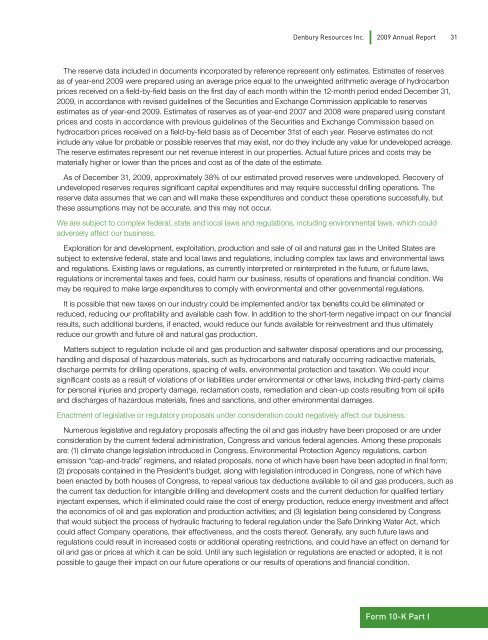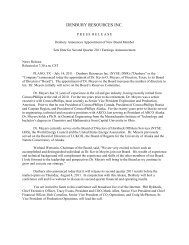Interactive 2009 Annual Report (PDF 7.56 MB) - Denbury Resources ...
Interactive 2009 Annual Report (PDF 7.56 MB) - Denbury Resources ...
Interactive 2009 Annual Report (PDF 7.56 MB) - Denbury Resources ...
- No tags were found...
You also want an ePaper? Increase the reach of your titles
YUMPU automatically turns print PDFs into web optimized ePapers that Google loves.
<strong>Denbury</strong> <strong>Resources</strong> Inc. <strong>2009</strong> <strong>Annual</strong> <strong>Report</strong> 31The reserve data included in documents incorporated by reference represent only estimates. Estimates of reservesas of year-end <strong>2009</strong> were prepared using an average price equal to the unweighted arithmetic average of hydrocarbonprices received on a field-by-field basis on the first day of each month within the 12-month period ended December 31,<strong>2009</strong>, in accordance with revised guidelines of the Securities and Exchange Commission applicable to reservesestimates as of year-end <strong>2009</strong>. Estimates of reserves as of year-end 2007 and 2008 were prepared using constantprices and costs in accordance with previous guidelines of the Securities and Exchange Commission based onhydrocarbon prices received on a field-by-field basis as of December 31st of each year. Reserve estimates do notinclude any value for probable or possible reserves that may exist, nor do they include any value for undeveloped acreage.The reserve estimates represent our net revenue interest in our properties. Actual future prices and costs may bematerially higher or lower than the prices and cost as of the date of the estimate.As of December 31, <strong>2009</strong>, approximately 38% of our estimated proved reserves were undeveloped. Recovery ofundeveloped reserves requires significant capital expenditures and may require successful drilling operations. Thereserve data assumes that we can and will make these expenditures and conduct these operations successfully, butthese assumptions may not be accurate, and this may not occur.We are subject to complex federal, state and local laws and regulations, including environmental laws, which couldadversely affect our business.Exploration for and development, exploitation, production and sale of oil and natural gas in the United States aresubject to extensive federal, state and local laws and regulations, including complex tax laws and environmental lawsand regulations. Existing laws or regulations, as currently interpreted or reinterpreted in the future, or future laws,regulations or incremental taxes and fees, could harm our business, results of operations and financial condition. Wemay be required to make large expenditures to comply with environmental and other governmental regulations.It is possible that new taxes on our industry could be implemented and/or tax benefits could be eliminated orreduced, reducing our profitability and available cash flow. In addition to the short-term negative impact on our financialresults, such additional burdens, if enacted, would reduce our funds available for reinvestment and thus ultimatelyreduce our growth and future oil and natural gas production.Matters subject to regulation include oil and gas production and saltwater disposal operations and our processing,handling and disposal of hazardous materials, such as hydrocarbons and naturally occurring radioactive materials,discharge permits for drilling operations, spacing of wells, environmental protection and taxation. We could incursignificant costs as a result of violations of or liabilities under environmental or other laws, including third-party claimsfor personal injuries and property damage, reclamation costs, remediation and clean-up costs resulting from oil spillsand discharges of hazardous materials, fines and sanctions, and other environmental damages.Enactment of legislative or regulatory proposals under consideration could negatively affect our business.Numerous legislative and regulatory proposals affecting the oil and gas industry have been proposed or are underconsideration by the current federal administration, Congress and various federal agencies. Among these proposalsare: (1) climate change legislation introduced in Congress, Environmental Protection Agency regulations, carbonemission “cap-and-trade” regimens, and related proposals, none of which have been have been adopted in final form;(2) proposals contained in the President’s budget, along with legislation introduced in Congress, none of which havebeen enacted by both houses of Congress, to repeal various tax deductions available to oil and gas producers, such asthe current tax deduction for intangible drilling and development costs and the current deduction for qualified tertiaryinjectant expenses, which if eliminated could raise the cost of energy production, reduce energy investment and affectthe economics of oil and gas exploration and production activities; and (3) legislation being considered by Congressthat would subject the process of hydraulic fracturing to federal regulation under the Safe Drinking Water Act, whichcould affect Company operations, their effectiveness, and the costs thereof. Generally, any such future laws andregulations could result in increased costs or additional operating restrictions, and could have an effect on demand foroil and gas or prices at which it can be sold. Until any such legislation or regulations are enacted or adopted, it is notpossible to gauge their impact on our future operations or our results of operations and financial condition.Form 10-K Part I




